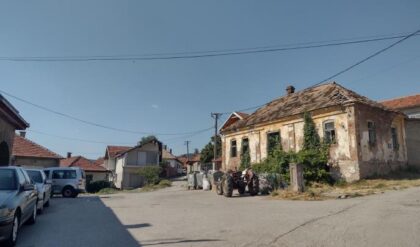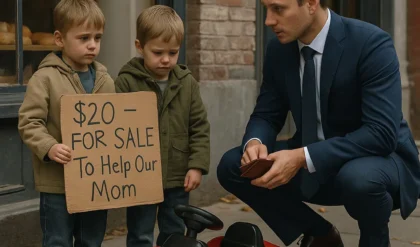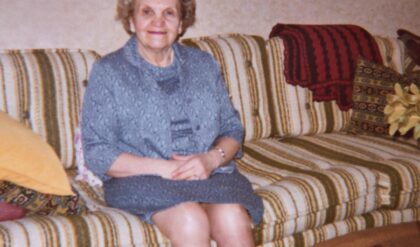The final signature dried on Callie’s discharge papers, and everyone promised I’d feel lighter.
Instead, an odd hollowness echoed in my chest while my daughter, half‑hidden by her rainbow mask, waved her stuffed bunny at each departing nurse.
We’d lost our apartment weeks ago; chemo‑room chairs had become my mattress, and the landlord’s last voicemail still buzzed somewhere in my forgotten phone.
Her father left first; my job followed soon after—silence replacing paychecks and promises.
So I forced a bright grin, smoothed Callie’s wisps of hair, and bought a balloon we couldn’t afford, pretending tomorrow was mapped out.
Two uniformed officers appeared at the lobby doors, their presence slicing through my practiced calm.
My pulse thudded—collections? paperwork?—until a nurse whispered, “They’re here for you, sweetheart.”
The officers hefted our worn duffels, muttering something about a “temporary placement”; I was too wrung‑out to argue.
Nurses lined the hallway, cheering like we were any normal family heading home; the elevator bell rang like a starting pistol.
Outside, one officer slipped a plain white envelope into my palm. “Open it in the van,” he murmured.
Buckled beside Callie, I stared at the envelope; a single name—Derek Monroe—was scrawled in the corner.
“Mom, can we get ice cream?” Callie breathed, exhaustion and hope tangled in her voice.
“Soon, love,” I said, as city murals and stray dogs flickered past, the envelope gaining gravity with each mile.
The van veered onto a sleepy street bordered by tidy hedges and pastel bungalows.
We stopped before a powder‑blue cottage, where a silver‑haired woman waited, arms gently folded.
“This will be your temporary placement,” the older officer said; my knees threatened to buckle—was this foster care? a shelter?
Before protest rose, the younger officer tapped the envelope in my fist, urging me to read.
Callie skipped up the walkway while Mrs. Harper—our porch guardian—hoisted the bags as if they weighed feathers.
“Come in, darlings,” she said, voice like chamomile tea.
Callie curled into a floral sofa; I stared at the envelope, Derek’s name blurring through sudden tears.
Could it be my brother—the one who vanished west after college, our calls thinning to postcards?
I tore the flap: a single key tumbled out, taped to a note—“Not charity—family. 427 Maple. No strings.”
427 Maple was this very doorstep; disbelief tangled with a fragile spark of hope.
His letter explained everything: he’d followed Callie’s fight from afar, bought this cottage outright, and wanted only to be her uncle again.
Mrs. Harper returned with lemonade and cookies, nodding at the note. “He’s quiet, but his heart’s loud.”
Warmth, safety, the startling sensation of being seen—each layered over me like a quilt.
Texts pinged first, then phone calls, then one evening a knock: Derek with pizzas and board games; Callie claimed him instantly.
Their laughter ricocheted off the cottage walls, cracking open a joy I’d forgotten existed.
Weeks blurred into months. Derek landed me part‑time work in a tiny bookstore; Callie marched into first grade, pockets full of crayon drawings.
One fiery sunset, Derek nudged me on the porch swing. “None of this changes how I’ve always felt,” he said softly.
Tears came—the good kind. “Thank you,” I whispered. “For finding us when the world shrugged.”
Life isn’t flawless—there are still co‑pays, pills, and cloudy scans—but the ground no longer feels like thin ice.
If this season taught me anything, it’s that drowning silently helps no one; reach up, and let the rescue line pull you through.
Family isn’t always blood; sometimes it’s the person who shows up exactly when the earth tilts.
If our journey stirred something in you, pass it on—someone scrolling in the dark might need the bold reminder that leaning on love is not weakness; it’s survival.




